-
![img]()
Homemade Stovetop Popcorn
Merryn Tan
July 27, 2021
2 min
Remember those days when we used to spend our leisure time at the cinema? I remember clearly walking into a movie theatre being greeted by the aroma of freshly buttered popcorn. The savoury aroma, the crunchy bite and the buttery finish. Ooooh la la, what I’ll do just to get that experience again.
But what if I tell you that we can actually pop our own corn in the comfort of our own home? I am not talking about those microwaved packet popcorns but legit popcorn from scratch on the stovetop.
Many of us may have the impression that making popcorn from scratch can be tricky.
There is some truth to it as popcorn kernels may burn at the bottom of the pan if not made properly but fret not as today, I’m sharing all of my popcorn-making tips so you, too, can make perfect stovetop popcorn at home. You'll need popcorn kernels and a good wok with a lid. Let’s start!
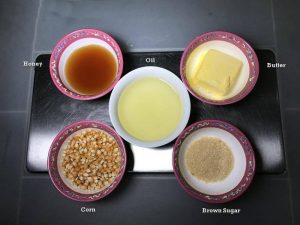 Ingredients for making popcorn at home: Corn kernels, vegetable oil, butter, honey and brown sugar.
Ingredients for making popcorn at home: Corn kernels, vegetable oil, butter, honey and brown sugar.The two basic ingredients for making popcorn are corn kernels and vegetable oil. Once you have mastered the art of popping corns, you may experiment with different toppings or coatings. In this post, I share how to make my boys' favourite caramel popcorn.
Homemade Popcorn

- 1 bowl corn kernels
- 1 bowl cooking oil
- 1/2 bowl honey
- 1/3 bowl brown sugar
- 1 tbs butter
Turn the fire on the stove.
Add oil.
Once the oil is medium hot, add in corn kernels in even layers.

Cover and let it pop.

Once it starts popping, shake the wok a little. This is to avoid burning the corn kernels.

Place the wok back onto the flame and leave the cover slightly ajar to let the steam out to get crunchier popcorn.
Turn the flame off when the corn stopped popping.

Remove popcorn from wok. Wipe the wok clean.
Bring the wok back onto the stove. Turn on the flame.
Add butter, honey and brown sugar.
Stir until sugar is dissolved.

Add the popcorn back into the wok, turn the flame off and coat thoroughly.

Remove from wok and store (the leftover ones) in airtight containers. My boys will wait in the kitchen each time they smell me making popcorn and dig in immediately once it is ready.

Enjoy with your favourite movie.
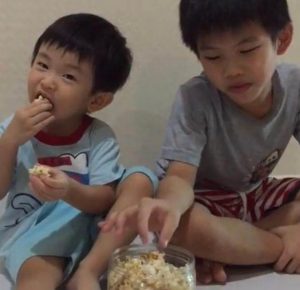
One of the benefits of eating popcorn is its high satiety. Due to popcorn's high fiber content, popcorn has been shown to make people feel fuller than a similar calorie amount of potato chips. So, what are you waiting for? Get your corn kernels today and start popping away!
https://youtu.be/ZJAdySWrd2s
For more interesting stories and fun recipes, stay tuned to Motherhood Story!
-
![img]()
Enfagrow A+ Mindpro Helps the Underprivileged Community
Sarah
July 23, 2021
0 min
Enfagrow A+ Mindpro recently completed a charity fundraiser in cooperation with Dignity for Children Foundation (‘Dignity') to support their efforts to provide impoverished children with access to quality education. The fundraiser is part of Enfagrow A+ Mindpro's "Fewer Sick Days, Sharper Minds" campaign, which was launched to coincide with the launch of their new formulation Enfagrow A+ Mindpro earlier this year.
Enfagrow A+ said in a statement that Malaysians should be recognised and appreciated for their support in helping Enfagrow A+ raise RM20,000 for Dignity's dedication. As a brand, it intends to continue encouraging Malaysians to donate to charities that help children grow and thrive.
Mead Johnson Nutrition's objective and purpose is to provide the best start in life for all growing children, and this pledge reflects that goal. This fundraiser also aims to honour Dignity's important efforts over the years, particularly in providing comprehensive care and education for urban poor children to thrive. Here's to a better tomorrow for our children!
Read more interesting stories and fun recipes on Motherhood.com.my!
-
![img]()
Could Your Child Be a Genius? Find out as Malaysian Mensa reveals the Clues
Helena Hon
August 03, 2021
11 min
Think your child might be Mensa material? You may have recognised some signs of giftedness but you’re not sure—like how he seems to be achieving all his developmental milestones way past his peers, is able to speak in complete sentences by a very young age, is very observant about the world around him, is curious about how things work and therefore, often asks a lot of questions? Could he also be very focused about completing tasks given to him, displays vivid imagination, abundant creativity and originality and has an amazing memory to boot?
Well, your child could have genius potential and there’s one way to find out for sure. You could test him at the Malaysian Mensa Society, the community for high IQ people, where, if admitted as a member, he could have a stimulating environment connecting with others of the same above-average intelligence, and where he could be cultivated to develop to the best of his potential.
The test would also help you as a parent, to better understand your child’s needs and where his talents can be identified and nurtured in the right academic or learning direction. Simply put, you would then be empowered to know how best to develop him.
Malaysian Mensa Society
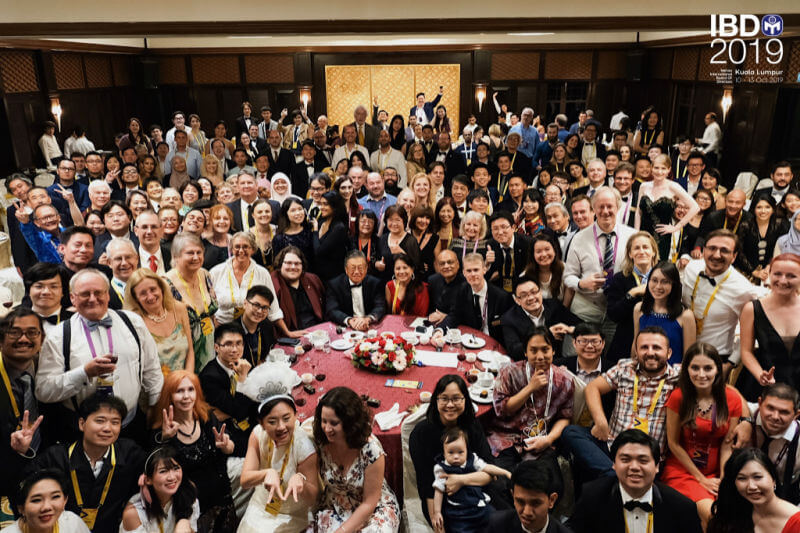 Mensa International represented here at the International Board of Directors (IBD) 2019 gala dinner. In the centre is Tan Sri Dato’ Yong Poh Kon, the founder of Malaysian Mensa and International Chair Björn Liljeqvist (Image credit: Malaysian Mensa Society)
Mensa International represented here at the International Board of Directors (IBD) 2019 gala dinner. In the centre is Tan Sri Dato’ Yong Poh Kon, the founder of Malaysian Mensa and International Chair Björn Liljeqvist (Image credit: Malaysian Mensa Society)The Malaysian Mensa Society is a chapter of Mensa International, a society founded by Roland Berrill and Dr Lanceot Ware in Oxford, England in 1946. They had a vision of creating an alliance of superior minds that could make significant contributions to the betterment of mankind in areas such as education, psychology, ethics and so on. Mensa welcomes anyone whose IQ is in the top 2% of the population.
The Malaysian Mensa was founded in 1984 by Tan Sri Dato' Yong Poh Kon. The goals of the society are:
- To identify and foster human intelligence for the benefit of humanity, to encourage research in the nature, characteristics, and use of intelligence, and to provide a stimulating intellectual and social environment for its members.
- To conduct research in psychology and in the social sciences, in particular, to send out questionnaires on a wide variety of topics to its members and to publish their results.
- To encourage widespread contacts and friendship among its members through social gatherings, together with meetings, conferences and special interest groups which bring together people with the same interests.
Because Mensa is international and known the world over as the gold standard for measuring intelligence, a Mensa qualification is like an international passport that opens doors and gives you higher regard everywhere you go.
More about Gifted Children’s Admission into the Malaysian Mensa Society
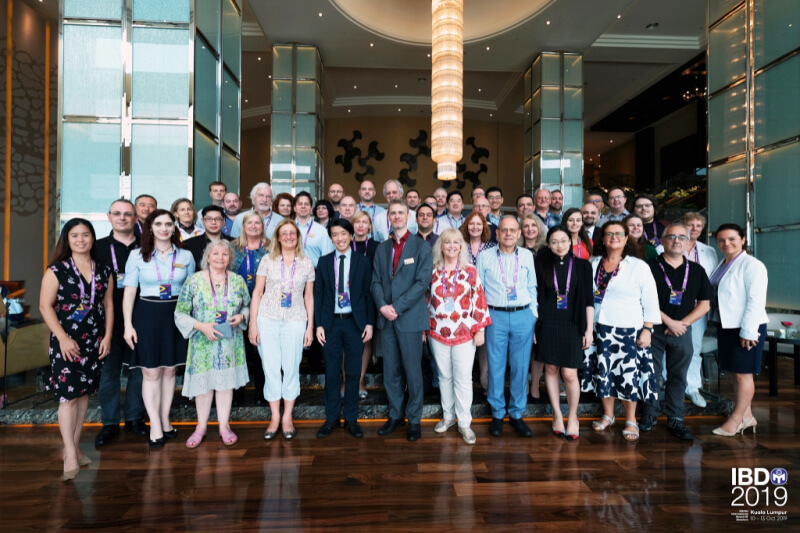 Chairpersons from around the world represented here at the Mensa International Board of Director's Meeting in Kuala Lumpur. (5th from Right, front row) Tan Kee Aun, Director of Smaller National Mensas and Acting Gifted Children Coordinator of Malaysian Mensa.
Chairpersons from around the world represented here at the Mensa International Board of Director's Meeting in Kuala Lumpur. (5th from Right, front row) Tan Kee Aun, Director of Smaller National Mensas and Acting Gifted Children Coordinator of Malaysian Mensa.Therefore, if you think you have a gifted child, you could have him tested at the Malaysian Mensa.
Tan Kee Aun, Director of Smaller National Mensas and Acting Gifted Children Coordinator of Mensa Malaysia, says parents of gifted children below the age of 14 can find out more about the tests at Malaysian Mensa Society for Gifted Children while those above the age of 14 can click at this link to see how tests are conducted.
Tan says this IQ Admission Test is required for anyone wishing to join the Malaysian Mensa Society but individuals below 14 years old do not qualify for the test as the measurement data does not cover the age group.
“Instead the tests used for children are more qualitative. Meaning they require a trained psychologist to observe and provide an assessment. Hence we have partnered with several testing centres who not only provide the test but also are able to provide consultation and follow up as needed.
“As a society, we endeavour to complement by providing a platform where members and parents may find a community to be able to lean on. Gifted children will be able to find their community and parents can find peers. It is also not uncommon for parents who have gifted children to also qualify to be members of Mensa after they have taken the Mensa Admission Test.
"Mensa’s policy towards testing is an individual only needs to qualify once. So no re-testing is needed for admission to the society.”
Tan reveals that the youngest Mensa member is four years old, and the oldest is 79 years old! The members come from all walks of life, and not necessarily in the fields of academics or rocket science.
For instance, did you know that Chin Ren-Yi, the co-founder of myBurgerLab, and actress, model-of-the-year Amelia Henderson are both members of Mensa?
How To Tell If You or if Your Child Is A Genius?
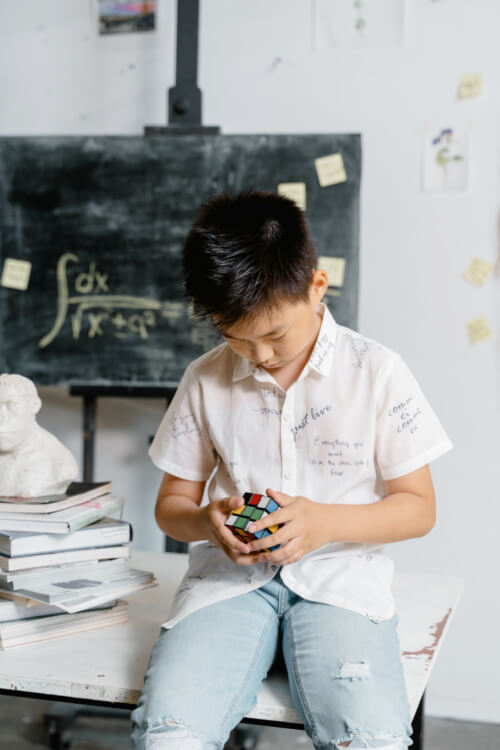 Does your child have an intense need for metal stimulation, or likes to solve puzzles? These are just two of the signs of higher intelligence. (Image credit: Pexels)
Does your child have an intense need for metal stimulation, or likes to solve puzzles? These are just two of the signs of higher intelligence. (Image credit: Pexels)But how does a parent know or realise that his or her child has higher-than-average intelligence? What are the signs of superior intelligence in an adult or child? And have people suddenly realised they may be geniuses when they are already in their middle age or adulthood?
Here’s What 2 Parents with Gifted Children Say
Parent 1
 Image credit: Unsplash
Image credit: UnsplashOn myself: Growing up, I had always been curious about why and how things work. I’m blessed to have access to loads of books and given the opportunity to ask a lot of questions. I remember during my primary years, while others were reading comics, I would be flipping the dictionary to learn new words. The cognitive advantage also afforded me a satisfying postgraduate education and professional career. But the reality is that there were very limited awareness/exposure on giftedness in the 80’s and 90’s, so I really wasn’t sure if I had a high IQ.
In my 40’s now, and out of curiosity, during the lockdown last year, I decided to take the Mensa test and was admitted into the society. The validation kick-started my reading about giftedness and helped me realise the idiosyncrasy of high IQ. For those who find themselves in this position, I definitely encourage you to read up about giftedness vs. talented, overexcitabilities, social and emotional needs of a gifted person through the vast literature available today. This newfound knowledge has helped me realise some of my underlying tendencies (such as perfectionism) and ways to cope with them (allowing myself to make mistakes and not holding too high a bar all the time)
On my child: The main reason for joining Mensa was to seek resources for my youngest child Nathan.
He is 6 years old. From the outset he is not that much different from any other boys of his age. He likes scooting and cycling. He runs and jumps and couldn’t sit still most of the time.
But during the period of online schooling in 2020, he was constantly complaining of being bored at school. We knew he was advanced in his learning, so we started to give him more advanced materials such as year 1-2 mathematics to satisfy his learning needs. By chance, we gave him a box of country facts and flag cards. In just a few weeks, we realised he had memorised all the 196 countries in the world. And in the next few weeks, he could recall all the flags of these countries vividly. Eventually we decided to have an intelligence assessment done at a clinical psychologist and the result showed he has an “extremely high” full scale IQ score.
It’s a feat to satisfy his inquisitiveness. Having intellectual overexcitability means that he asks “why” all the time. He is not satisfied with simple answers and gets bored easily when learning is not stimulating enough.
Gifted children often have asynchronous development. While certain areas of his cognitive development is more advanced than his peer, Nathan is still a child at heart and often needs help to regulate his emotions. Due to his perfectionist nature, at times he is not willing to try new things (unless he thinks he can master those areas), or gets frustrated easily when he gets something wrong. These cognitive and emotional development needs are often not met by the standard education system. As parents we needed to equip ourselves to understand the needs of gifted children, advocate for them and help them to be independent. I will encourage gifted parents to be equipped: read more about giftedness, acknowledge that they are different, be supportive of your child, and join support groups such as Mensa Malaysia Gifted Youth Special Interest Groups.
Parent 2
 Image credit: Pixabay
Image credit: PixabayOn our son: We noticed Piersce picks up concepts fast and remembers what he hears and sees at first exposure. He can recite his ABCs from front to back and then back to front, started reading English books, recognised around 300 Chinese words, counted to 100 and counted backwards, do 2 times tables, recognise Ringgits and Euros, and can name the continents on a globe map before 3 years old. He uses big vocabularies and talks like an adult sometimes. He understands deep concepts and never insists we buy him a toy if he knows that it is pricey. When he was 3 years 10 months old, he could count in 10 languages that we taught him in less than a month just for fun, and it was just before and during Chinese New Year (CNY) at that time. It was then that our families were very impressed and my father-in-law suggested that we get him tested. So we did after coming back from CNY and his IQ was found to be extremely superior and was accepted into Mensa.
Currently at 5 years old, Piersce is doing 8-year-old Maths and Chinese (reading). He is a perfectionist and doesn’t like getting things wrong. Realising that may affect his ability to try, we encourage him to treat mistakes as opportunities to learn. He is willing to try now and is enjoying the challenge. When younger, he used to be extremely focused when he is onto something until he completes it, for example a puzzle. He is also very curious and active with lots of energy and never stops touching things to explore. He also asks questions about how things work and lots of “why” this and that all day long ever since he could speak.
He doesn’t sleep in the afternoons nor does he sleep much generally. Recently we let him learn piano play-by-ear just to keep him occupied during the MCO and he could play simple songs that he hears and likes. We also let him learn coding and mobile app design. He goes hiking, scootering and cycling on the weekends and he loves playing Monopoly.
Motherhood Asks More Questions about High Intelligence
 High IQ people are innately curious (Image credit: Pexels)
High IQ people are innately curious (Image credit: Pexels)1. Motherhood: Is genius IQ linked to a skill or talent? Such as being able to speak in a range of languages, have superb musicianship, paint, invent things etc.?
Tan Kee Aun: High IQ people are innately curious leading to interest in learning things and exploring deeply into a topic or subject. Hence it’s not uncommon for High IQ individuals who might be deeply invested in a few uncommon topics. It is this interest to understand a subject at a deeper level more than others that gives leads to an increased understand and skill of something.
2. Motherhood: Do you think high intelligence is hereditary? Or could this be a “fluke” where parents of normal intelligence suddenly discover their child is exceptional?
Tan Kee Aun: It’s both. There is the nurture vs. nature argument. For some individuals, they may have had the genetic potential but due to environmental reasons like nutrition and upbringing, those individuals never reach their full intellectual potential. It also depends on the parents if they are able to get their children tested to measure their intelligence and after obtaining the results, be able to provide the environment to further develop and build on that capability.
3. Motherhood: What is the IQ score required to be a member of Mensa Malaysia for children below 14, and for adults?
 To be admitted to the Malaysian Mensa, there is no fixed IQ that one must score. So long as the score is at the top 2% of the population, one is qualified. (Image credit: Freepik)
To be admitted to the Malaysian Mensa, there is no fixed IQ that one must score. So long as the score is at the top 2% of the population, one is qualified. (Image credit: Freepik)Tan Kee Aun: There is no fixed IQ score as different tests have different scales and standard deviations. Think of it like measuring using inch and cm and feet rulers. The only criteria is the score is in the top 2%.
4. Motherhood: So Mensa accepts all individuals with an IQ in the top 2% of the population. Can you simplify an explanation of “IQ at the top 2% of the population”?
Tan Kee Aun: Imagine having 100 people measure their height. We have 20 people below 150cm, 60 people between 160cm and 210cm, another 18 people 210 - 230cm and the last two people, being the tallest are more than 230cm tall. Those two people are the top two tallest of the group of 100 people. In other words, the top 2%. If we were measuring 1,000 people, then the top 2% would be the 20 people who have the highest height.
5. Motherhood: In what way does the Malaysian Mensa help nurture or serve the gifted?
Tan Kee Aun: The direct benefits to members vary as our studies show that the reasons why members stay as members are vastly different and varied as the members themselves. However, we have found that each and every member stays because they have found something deeply meaningful and deeply personal in the society.
For gifted children, it is about finding a place where you are deeply understood among peers who see and experience life at your mental pace.
Events frequency pre-pandemic would range from weekly to monthly as we have many Special Interest Groups that organise events on their own.
On a national level, we organise monthly meetups, annual gatherings and world conferences. Among them include:
- Forum Of Intelligence (August 14, 2021) - A forum for Parents of Gifted Children to discuss giftedness in youth, and how to support their unique social and emotional needs. This online event features local and international speakers including Dr Keri M. Guilbault, Assistant Professor of Gifted Education at John Hopkins University. (Please click on mensa.my/forum of intelligence if you are interested to attend)
- The Mensa International Board of Directors Meeting
- myStarjobs IQ Testing
- Annual General Meeting
- Year End Bash
 These are some of Mensa’s event. (From Left): Students participating in the Malaysian Mensa Puzzlers Challenge organised by Penang Mensa; At the mystarjobs 2019 (Image credit: Malaysian Mensa Society)
These are some of Mensa’s event. (From Left): Students participating in the Malaysian Mensa Puzzlers Challenge organised by Penang Mensa; At the mystarjobs 2019 (Image credit: Malaysian Mensa Society)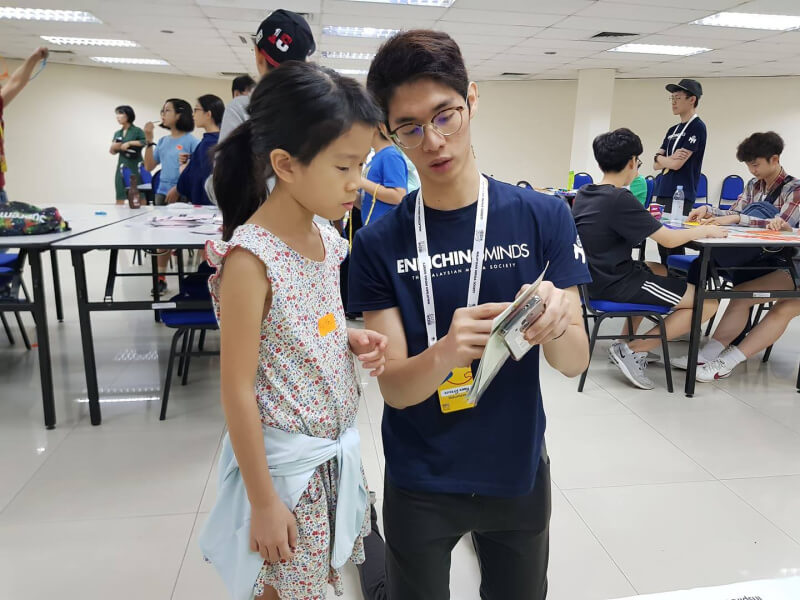 Volunteers helping out at the Julia Robinson Math Festival 2019 organised by the Mensa International Gifted Youth Committee 2019 (Image credit: Malaysian Mensa Society)
Volunteers helping out at the Julia Robinson Math Festival 2019 organised by the Mensa International Gifted Youth Committee 2019 (Image credit: Malaysian Mensa Society)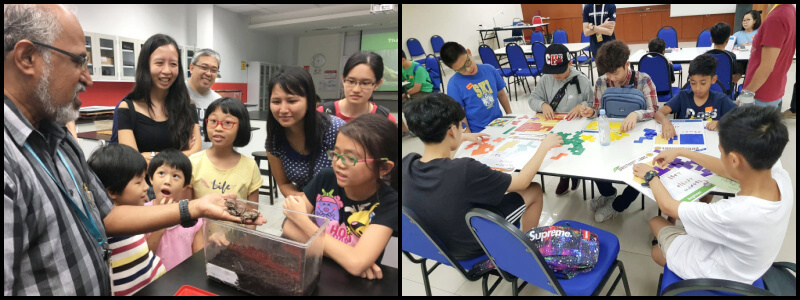 (From Left) Members visiting Dr Sagathevan's lab to learn about reptiles and curious creatures; Participants solving puzzles at the Julia Robinson Math Festival 2019 (Image credit: Malaysian Mensa Society)
(From Left) Members visiting Dr Sagathevan's lab to learn about reptiles and curious creatures; Participants solving puzzles at the Julia Robinson Math Festival 2019 (Image credit: Malaysian Mensa Society)Now that we have talked about the Malaysian Mensa Society, who are the Gifted Super Intelligent Children who are members of this society? Watch this space on Motherhood Story to meet them one by one, very soon.
-
![img]()
AskMeDoctor! Season 2 Episode 16 Part 2: Children's Development Milestone
Fairuzal Aula
July 28, 2021
3 min
In the previous episode of AskMeDoctor!, Dr. Foo Chee Hoe already shared the general knowledge about children's milestones and the factors contributing to their development.
For the second part of the same episode, Dr. Foo will focus more on the parents' role and responsibilities in a child's development. Photo credit: xFrame
Photo credit: xFrameQ5: Are effective parenting practices playing an important role in a child’s development as well?
Dr. Foo: Environmental factors are very important for a child’s development and this is very much in our hands.
So, effective parenting style, parenting practices are important to provide their physical needs and psychological needs.
Parents must have a good practice that will ensure the child gets adequate healthy nutrition, good medical care, provide a safe secure place for them, a good school for them to grow and develop and also psychologically.
Ensure that the child has a sense of security, do let them know that they are loved for, they are cared for, give them affection as well as teaching them how to nurture and grow, develop emotionally, and psychologically.
All these are very important to help them to grow to their utmost potential.Q6: Is developmental monitoring or screening important and how to conduct that?
Dr. Foo: Yes, developmental screening is very important because we want to detect any possible abnormality as soon as possible so that we can take action to reverse the decline and to determine the cause for such delay.
How do we conduct that? Actually, we have always been doing that opportunistically by chance.
Whenever they come to the clinic for their routine visit, whether you go to government clinics or private clinics for your vaccination, this is the time – besides measuring your height, weight and head circumference, we will also be assessing your child’s development milestones.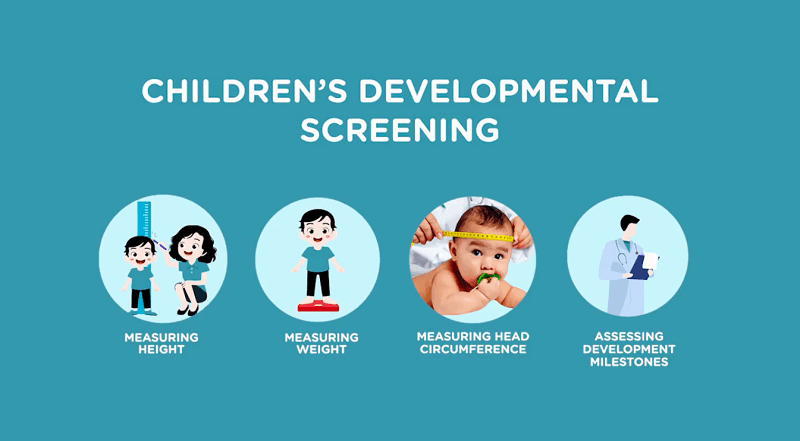
Usually, for children who have achieved all the milestones, the assessment can actually be very fast.
Sometimes the parents may not be aware of it, but, actually, the paediatrician is observing all the milestones just by observing the child; seeing how they walk and how they sit up can already give a lot of information.
If we detect any red flags as in there are some developmental milestones that are not yet achieved by a certain age,
then we will advise for further tests and assessment. We would like to refer the child to a developmental paediatrician.
Sometimes we need to do a blood test, we need to do hearing test, so that we can confirm the diagnosis and then we move on to plan a syllabus and training therapy schedule for the child so that they can maximize their growth and developmental potential.Q7: Should I worry if my child is passive and not as active as his peers?
Dr. Foo: Generally, I think children — they are very active people, they are active seekers of play opportunities, they love to play, they are actively seeking knowledge, they are curious about a lot of things.
Of course, there are certain moments, especially when they start to develop stranger anxiety, in their social-emotional behavioural skills development, sometimes they can feel shy in certain situations.
So, it really depends on the parents’ observations.
If the child is significantly very inactive at all times and socially withdrawn at all times, we observe how they are in school, in kindergarten, then it should be a cause of concern if they are really very withdrawn, very passive, no moments of being active at all.
Please discuss with your doctor if you encounter or if you have any concerns about these.Q8: What if my child does not meet a developmental milestone?
Dr. Foo: Usually parents should have a checklist for them to match the age of their child with what their child can do.
But, if you detect or you are concerned about — there are some possible delays, please do not jump to conclusions first.Oh my child is delayed compared to my neighbour’s child, compared to my sister’s child, my son is so slow etc.
But, please discuss your concern with your family doctor, with your paediatrician and then we will assess together, we will ask more questions, we will do physical examination, we will assess developmentally and then if we really detect there is an abnormality like I have said earlier, you would then move on to refer to a developmental paediatric team—for them to be assessed, to do a hearing test, maybe a blood test—and then very importantly, if they really need more therapy sessions like:- Speech therapy
- Occupational therapy
- Physical therapy
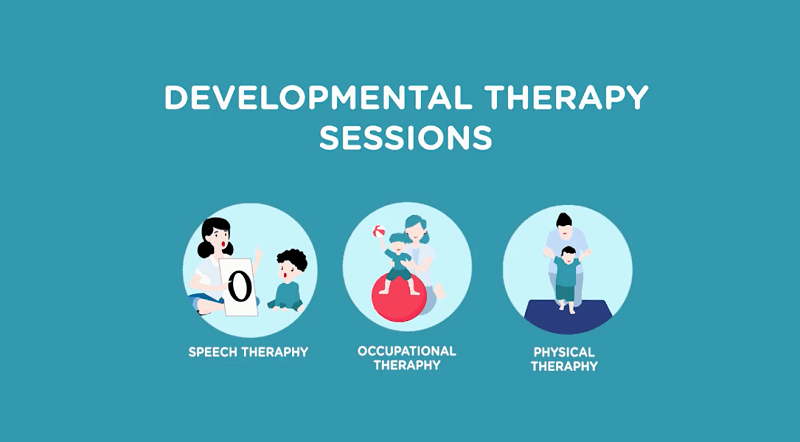
The sooner we start such intervention, there would be more potential they would achieve.
https://www.youtube.com/watch?v=YATtIe3LueQ
So, parents, we hope this sharing by Dr Foo gives you more information and knowledge about children's developmental milestones.
Please take note that every child is different. Thus, DO NOT compare your child with other children because every individual's developmental milestone is different.
For more videos about children's health, stay tuned on AskMeDoctor! If you have any other questions or a specific topic that you want our doctors to answer, visit our Facebook page today. -
![img]()
AskMeDoctor! Season 2 Episode 16 Part 1: Children's Development Milestone
Fairuzal Aula
July 26, 2021
5 min
Skills such as taking the first step, smiling, rolling over, crawling, walking and more are all considered milestones. There is a normal range in which these milestones are different for each age group.
In this episode of AskMeDoctor! we have Dr. Foo Chee Hoe, a paediatrician from Dr. Foo Child Specialist Clinic to share with us about a child’s development milestone.Q1: What is the healthy development of a child?
 Image Credit: chickyolive.com
Image Credit: chickyolive.com
Dr. Foo: A child will be developing healthily when they are consistently and gradually acquire all the developmental skills from the state of a tiny vulnerable newborn baby to a bigger, older child.
So, if you observe a baby, from newborn time all the way to five years old, we can see a very remarkable progressive acquisition of developmental skills.
We identified four (4) key areas whenever we talk about the developmental ability of the child that he/she should be consistently, gradually and steadily acquire:- Gross motor function
- Fine motor and vision
- Speech, hearing and language skills
- Socio-emotional behavioural skills
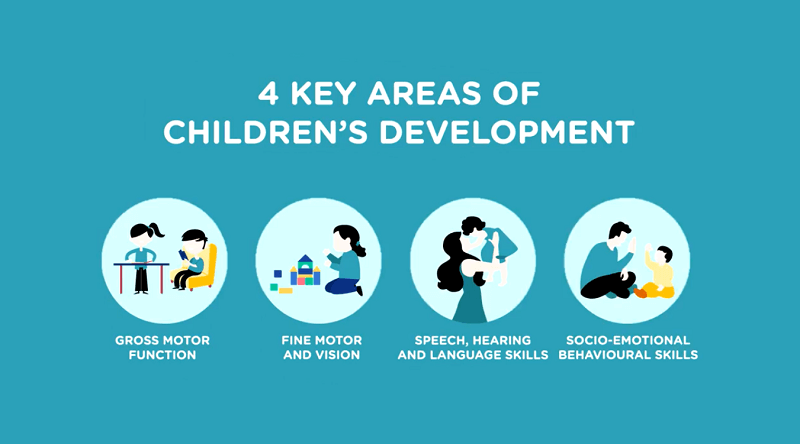
Q2: What is a developmental milestone?
Dr. Foo: A milestone is like a flagship developmental skill that we put in place, at a specific age range.
So that, it is easy for us to assess and identify whether there is any reason to be concerned about the development.
If a certain milestone developmental skills are not achieved by a certain age, then it could raise a red flag to us that make us very concerned whether there is a developmental delay in the child.Q3: Can you elaborate about the developmental milestone at a glance?
Dr. Foo: A child will progressively acquire skills from a tiny baby all the way to a bigger child.
So, in these four (4) key areas, let's start with gross motor.Gross Motor Milestones
In the area of gross motor function, they should have a good neck strength with no head lagging between 3 to 5 five months.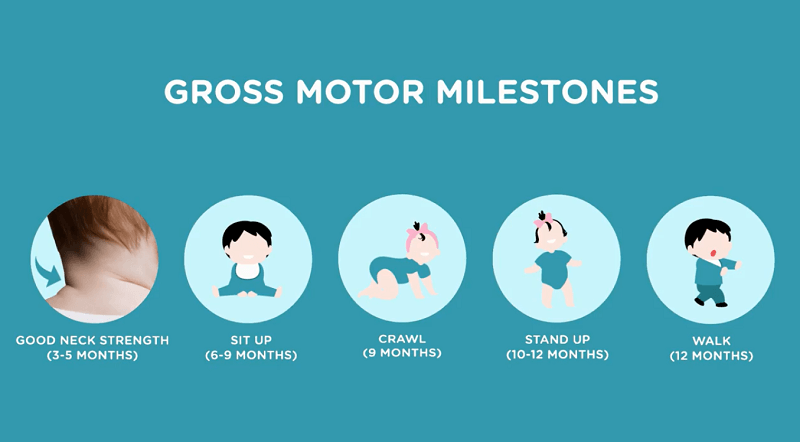
They will sit up by 6 to 8 months. Usually, they will sit up very well, straight back between 8 to 9 months.
They usually crawl by 9 months and they are able to pull themselves up to stand up at 10 to 12 months.
They can walk by holding on to the furniture at around 12 months. They should walk independently by 18 months and then progress into running, climbing, jumping, ball kicking as they move on all the way.
By after 2 years old, they should be very actively running, confidently acquire more and more motor skills.Fine Motor Skills
When talking about fine motor skills, fine motor coordination is very much linked up with their visions.
So, we assess their visions first.
By 6 weeks to 2 months old, their eyes should be tracking a moving object very well—usually your face or a very bright, interesting coloured object—so their eyes will follow a moving object, from left to right.
And then by 4 months of age, they should be able to try to reach out for a toy and then by 6 months they can use their palm to grasp the toy.
And by 10 months they should able to have a pincer grip, means not just using a palm to grasp, they can actually use two fingers like a chopstick like that, usually the thumb and the index finger to pince, to grasp, to grip on a tiny object by 10 months of age usually.
And of course, after 1 year old, they will progress to hold writing utensils to scribble, to draw, and then from scribbling they will be able to draw pictures they can write as they progress to 2 to 3 years beyond.
And they should be able to also stack cubes after 1 year old, from a tower of 2 cubes becomes a tower of 3 cubes and 6 cubes as they grow older and older.Speech & Hearing
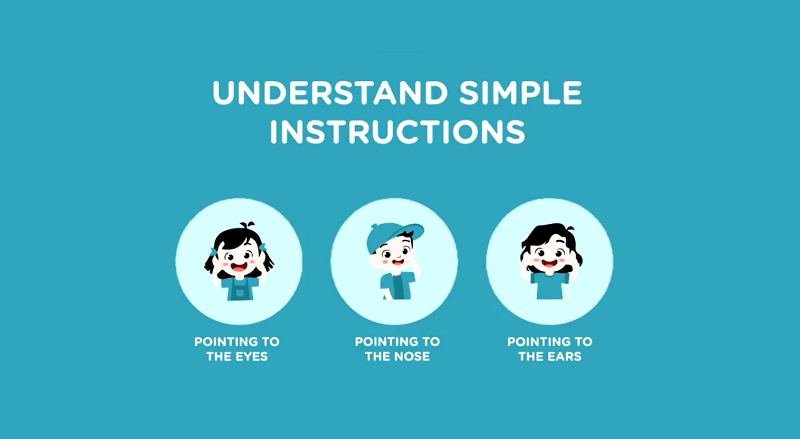
In terms of speech and hearing, they will be able to make sounds and laughs by 4 months of age, usually around that.
They can call papa, mama between 10 to 12 months, usually they will call papa first, papa seems to be easier.
At around 12 months, they should also have 2 to 3 words besides papa and mama and they should be able to understand when they are called and they can understand simple instructions by 12 months, can understand ‘no’, they can understand ‘come here’.
By 1 and a half years old, they should be able to point to their body parts when named, such as ‘show me where is your eye’, they should be able to point to their eye, ‘where is your nose, where is your ear’, something like that.
At least 3 body parts by 18 months. This shows that they are able to receive the audio message, be able to process in their brain and execute it out.
Comprehensive language is very important. For the children between the age of 1 to 2 years old, they should demonstrate a very good level of comprehensive language.
As for expressive language, how many words they can talk. It can be more subjective and has a broad variation between children to children.
But, you must have a comprehensive language before you are able to speak up to express. So, from the simple 2 words, 3 words at 1 year old, you will then progress into able to make 2 words short phrases by the age of 2 years old.Socio-emotional Behavioural Skills
Then comes to the socio-emotional behavioural skills, just as when their vision is developing to be able to look at a face, so, they should be able to smile responsively by 6 weeks old and then they will learn to put food in their mouth by 6 months, they have mouthing.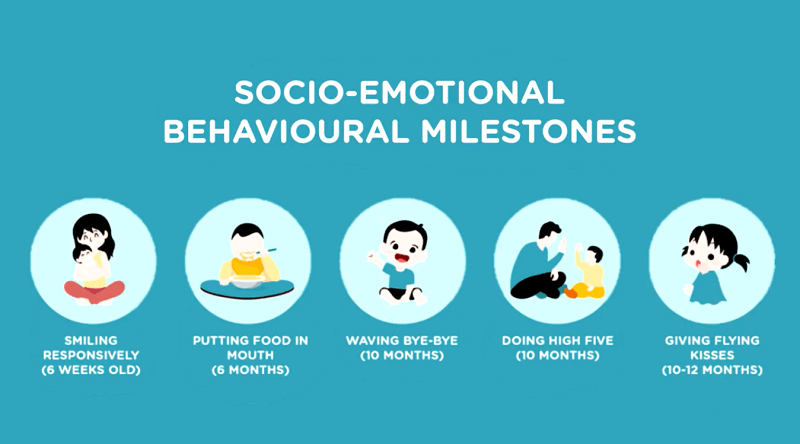
And then they can wave bye-bye, they can maybe even do high five and flying kiss between 10 to 12 months. They can feed themselves, use a spoon, maybe very clumsily, it doesn’t matter.
They can use a spoon to have a concept of putting food into the mouth with a spoon by 18 months.
And then they can have imaginative play by 2 years old, they will be toilet trained at least the day time, they are dry by day, they do not need to wear diapers anymore they can indicate they need to go to the toilet between 2 to 3 years old depending on how soon they are willing to be trained.
And 3 years plus, they will have more advanced kinds of play – imaginative play, interactive kind of play, taking turns to play, pretending, imagining and etc.
So, all these 4 key areas, at the glance, of course, it could be like a lot of information overload, but, like you, each parent can have a checklist and also the doctor will also have a checklist to check on them whenever they have a chance to see them.Q4: What are the factors contributing to their development?
Dr. Foo: In short, there are two factors – medical organic factors and environmental factors.Environmental factors
So, let’s start with environmental factors first. The environment means where the child grows up. So, there will be physical needs and there are psychological needs.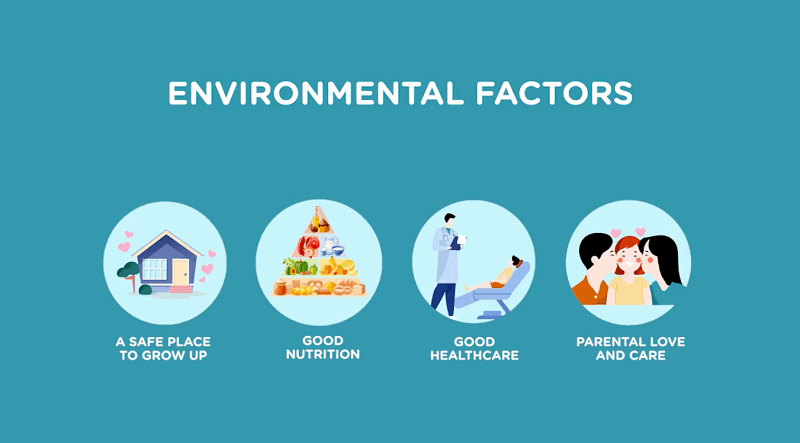
The physical needs factors would be the child should have a safe place to grow up, a healthy place with good nutrition, and good healthcare.
So, all these will ensure the child is able to grow up healthily and therefore, develop properly. And also psychological needs, we cannot just give food and shelter and that’s it, leave the child behind.
I think parental love, affectionate love, love and care give the child a sense of confidence security and also to provide leadership by example be a good role model for your child especially when they go into tantrums, you know, how you teach them.
These are important factors, these are the environmental factors and these are under the control of the parents, usually. The things that are out of control would be the medical reasons.Medical Reasons
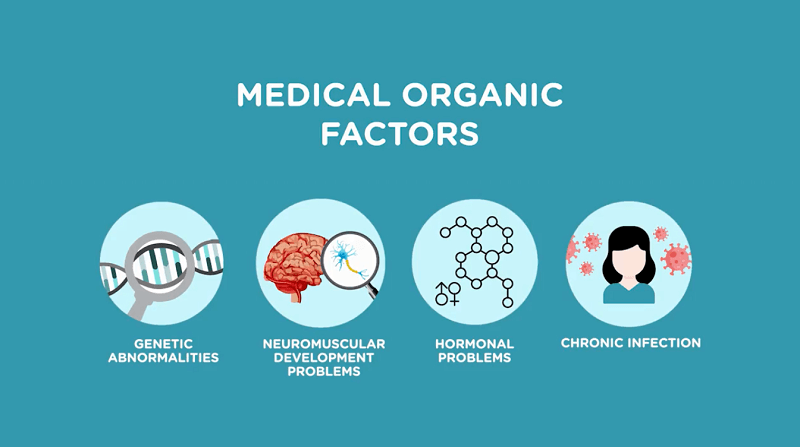
Sometimes, unfortunately, the child may have genetic abnormalities, neuromuscular development problems, hormonal problems or they are going through a chronic infection.
All these will restrain and hinder the child's development. All these could factor into the child’s development.
https://www.youtube.com/watch?v=n0mtTJicwCA
Wait! That's not all. This is only the first part of the video.
Stay tuned for Part 2 of the Children's Development Milestone and for more AskMeDoctors! videos at Motherhood Story.
Navigation
Our menu boxes are very flexible and easy to use




